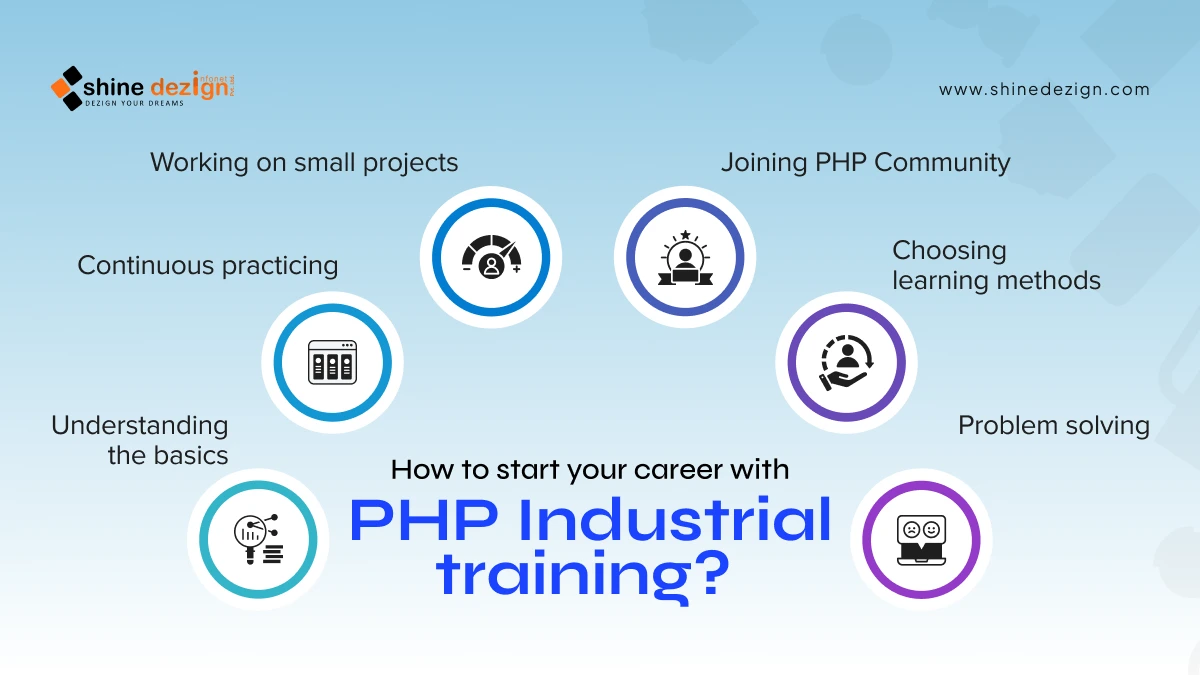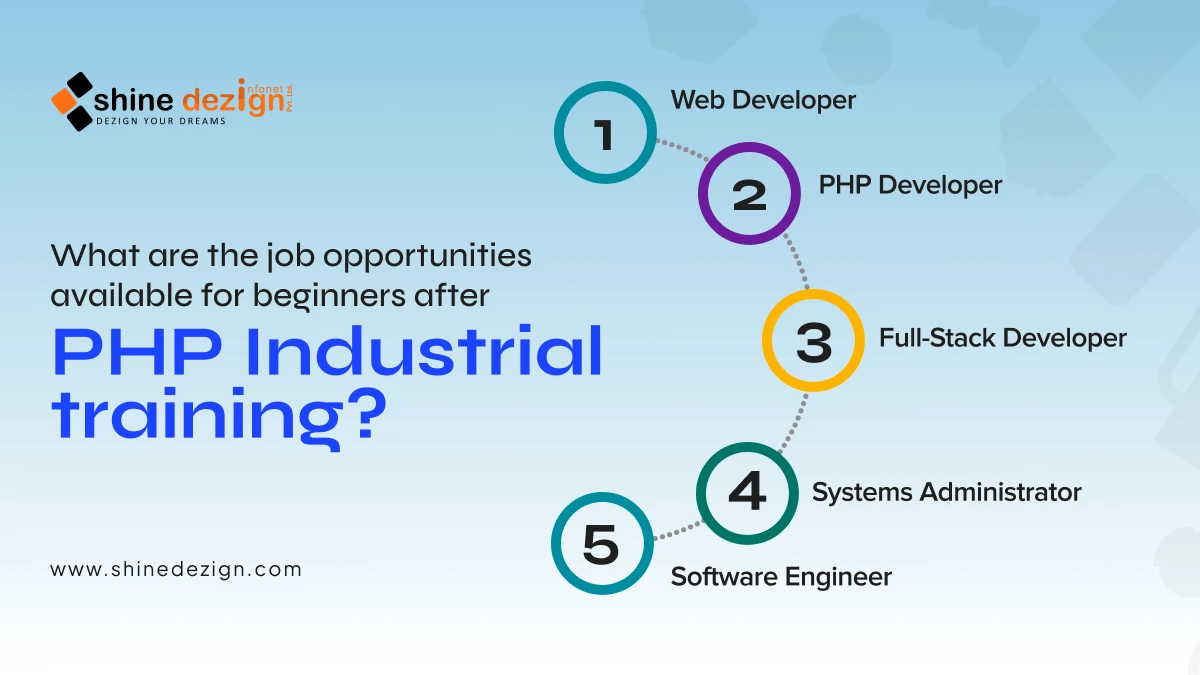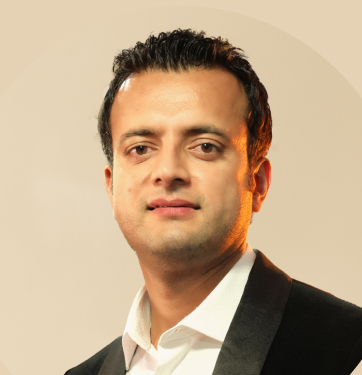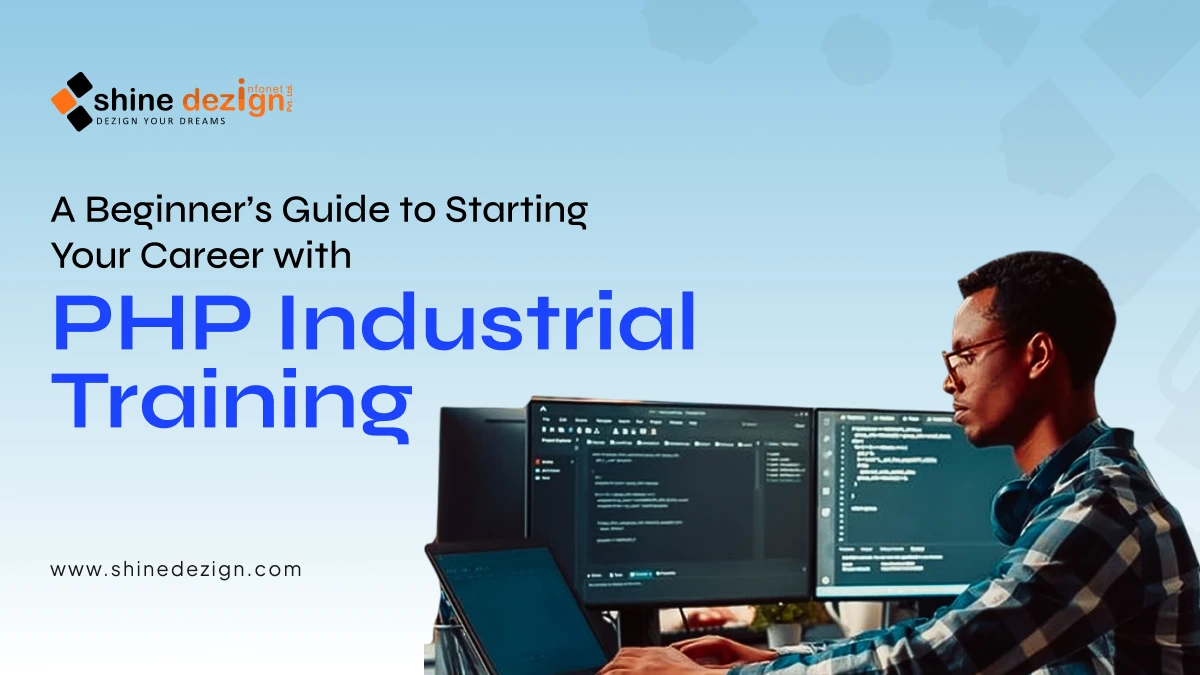PHP is a widely used server-side scripting language for web development. It powers a significant portion of the web. PHP stands for Hypertext Preprocessor, earlier it was acronym for Personal Homepage. Industrial training fills up the gap between theoretical knowledge and real-world work field experience.
During PHP Industrial training, you will learn to equip all your knowledge in the practical field and will understand the errors and problems arising during implementation. This will help you to overcome the drawbacks and provide enhanced outcomes. This blog will guide you about the steps. By following these few steps, you can kick start your career in PHP efficiently.
How to start your career with PHP Industrial training?
Here are the few points or steps that will help beginners to kickstart their career with PHP industrial training. Considering these points will prove effective in making your career seamless. The points or steps are:

Understanding the basics
1. Understand the core PHP concepts:
Keenly understand the fundamentals of PHP like variables, datatypes, data bases, other applicational functioning (like User authentications, themes, Real-time apps, etc.). Also, understand the concept of operators, arrays, control structures (like if/else, loops), and Object – Oriented Programming (OOP).
2. Programming languages:
Understanding the programming languages (like HTML, CSS, JavaScript) is crucial for developing web technologies. HTML is used for structuring the content whereas CSS is used for styling and JavaScript for merging interactivity in web technology.
3. Database fundamentals:
Get familiarized with database concepts, specifically SQL. Learn how to interact with databases, such as retrieving, inserting, updating, and deleting data, while using PHP.
Choosing learning methods
1. Online/Offline courses
For understanding PHP in depth beginners can enroll themselves in PHP courses. In these courses, they will get to know about PHP, the technologies and tools used in PHP, the programming languages, etc. Then look for the right institutes and join PHP courses to learn all the insights of PHP. Shine dezign offers 6-weeks or 6 months training and internship program. They offer various courses. Enroll yourself in the PHP development course, provided by Shine Dezign, with extensive benefits to you.
2. Video tutorials
Beginners can explore online video tutorials to gather information about PHP for short-term or small projects.
Books, internships and documents are also helpful in gaining knowledge for PHP.
Working on small projects
1. Build a portfolio
Build your portfolio with small projects like creating a to-do list application, basic calculator, small e-commerce website, etc. It will help in enhancing your employability.
2. Contribute to open-source projects
Beginners can contribute to open-source projects on platforms like GitHub to gain real-world experience and collaborate with other developers. It will increase networking opportunities for them.
3. Personal projects
Start working on your personal projects that reflect your area of interest in PHP and it will help in building a strong and effective portfolio. It will increase your employability and reliability in the dynamic job market.
Joining PHP Community
1. Connect with mentors
Connect with your mentors and industry professionals to seek reviews and recommendations.
2. Build networks
Industrial training helps in building generating networks with industry professionals and it helps in enhancing the job opportunities.
3. Attend conferences
Attend local PHP meetups and conferences to network with professionals and gain insights into industry trends.
4. Online forums
Participate in online forums and communities like Stack Overflow to ask questions, share knowledge, and learn from experienced developers to expand your knowledge.
Problem solving
1. Identify the problem
Identify the problems in your code and technologies or set up.
2. Breakdown the problem
Learn to breakdown the problem into smaller parts to make it easy to solve.
3. Debug the problem arising
Debug the problems efficiently while seeking guidance from mentors and professionals.
Continuous practicing
Continuous practicing of the tools, technologies and codes will help you in enhancing your skills and attaining perfection in your field or job role.
Here are some additional tips to start your career with PHP Industrial Training
1. Stay updated
Stay updated about the emerging technologies and changes in PHP like its version updates, and its frameworks (like Laravel, Symphony, CakePHP, etc.).
2. Explore new technologies
Continuously keep learning and exploring new technologies related to web development, such as cloud computing, APIs, and security.
3. Focus on practical training
Keenly focus on practical training for your skill enhancement. Practical training with theoretical knowledge laid the foundation stone of a beginner’s successful PHP career.
4. Consult with your mentors
Consult with your mentor while working on any project and seek their recommendations. Keep asking questions to the mentors or professionals to broaden your knowledge area.
5. Choose the correct institute
Select an industrial institute with a strong track record, experienced instructors, and industry connections. Consider all the other factors like accreditation, fee structure, facilities, career support and many more to compare carefully.
6. Prepare for interviews
Practice answering common interview questions, prepare your resume and portfolio, and conduct mock interviews. Apply for suitable and related job interview within time.
What are the job opportunities available for beginners after PHP Industrial training?
Beginners get dynamic job opportunities after learning PHP in industries like Information technology, manufacturing for telecommunication, broadcasting and media, and many other related fields. Common job roles after learning PHP are: –

1. Web Developer
A Web developer uses PHP to develop and maintain websites and web technologies. They also design and develop web applications.
2. PHP Developer
PHP developers are responsible for developing and maintaining PHP applications. They use PHP, HTML, CSS, and JavaScript to develop web applications.
3. Full-Stack Developer
Full-stack developers are responsible for developing both the front-end and back-end of web applications. They also use PHP, HTML, CSS, and JavaScript to develop web applications.
4. Systems Administrator
Systems administrators are responsible for maintaining and configuring computer systems. They may also be responsible for installing and configuring PHP applications.
5. Software Engineer
Software engineers are responsible for designing, developing, and testing various software applications. They use PHP to develop web applications.
5. Database Administrator
A PHP developer can easily administrate databases utilizing PHP. The primary role of Database administrator is to manage data using Web technologies.
6. PHP Developer
A PHP Developer is a specialist in designing, testing and implementation of software by implementing PHP programming language.
7. Laravel Developer
A Laravel developer designs and builds tools & services for a website.
8. Web Application Developer
A web application developer works on designing, developing and maintaining web application-based software.
9. Software Architect
It involves designing complex systems and making high level design choices including software coding standards, tools, platforms, etc.
10. Project Manager
Experienced PHP & Laravel developers can advance toward management roles overseeing the projects.
Wrapping It Up
PHP has been the industry’s favorite language for developing dynamic web pages. Using it with frameworks like Laravel, Cake PHP, Zend Framework, Yii, CodeIgniter, Symfony and many other frameworks, you can build anything from complex dashboards to interactive applications and everything in between. The language is open-source and available for free use. There’s a large community of developers who use it regularly.
There are various ready-made plugins and libraries you can use with it. So, if you’re looking to work in web development, learning PHP and finding a job in this field is a good choice. You can check for the best training programs that will help you to learn the basics, network with other developers, learn a framework, and stay updated with new technology. These tips will help set you apart in a competitive field, learning PHP may be a smart move.
Your questions, our answers
PHP industrial training is a practical learning experience designed to bridge the gap between theoretical knowledge and real-world application in the field of PHP programming.
Advantages for beginners: 1. It is beginner friendly. 2. It is an open source. 3. It is a simple scripting language. 4. It is easy to learn for beginners. 5. It is flexible.
Benefits of PHP Industrial training is: 1. It helps in gaining practical experience. 2. It builds a strong portfolio. 3. It helps in enhancing employability. 4. It develops valuable industry connections.
Career opportunities like Web Developer, Laravel Developer, PHP Developer, Software Architect, Database Administrator, Software Engineer, Systems Administrator and many other job opportunities you will get after learning PHP.
Programming languages like HTML, CSS, and JavaScript are commonly used in PHP.
PHP stands for Hypertext Preprocessor, earlier it was acronym for Personal Homepage previously.
The frameworks of PHP are: Laravel, Cake PHP, Symfony, Yii, Zend framework, Fuel PHP, CodeIgniter













